-
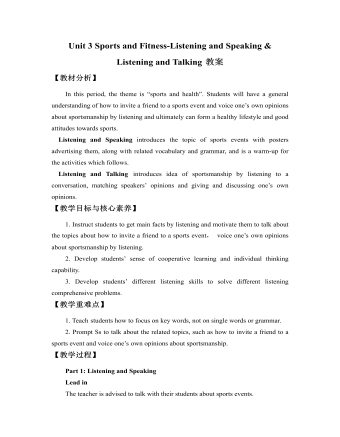
新人教版高中英语必修1Unit 3 Sports and Fitness-Listening and Speaking & Listening and Talking教案
Finally, after finishing the task above, the teacher is expected to instruct students to work in groups to finish the following project:Speaking ProjectWhat event or activity would you like to invite your friend to? Make a conversation with a partner.Ski Race: Zhangjiakou, a beautiful city in northern China, will host the Youth Ski Race in December.Track Meet: a great event for track –and –field lovers on 26 October.Gym Class: come and work out at a gym! You can make it.Part 2: Listening and Talking:The teacher is advised to talk with their new students about the related topic: Boys and girls , what do you think of sportsmanship? Let’s listen and find out:Play the listening and match each opinion with the right speaker. Who do you agree with? Why?Cao Jing _____________ Lily _____________ Max _____________A. An athlete should do his/her best to win.B. The girl should stop and help the other girl. Good sportsmanship is more important than wining!C. An athlete should think about honor and his/her fans if he/she is competing for his/her country.Listen again and circle the expressions that you hear in the conversation.
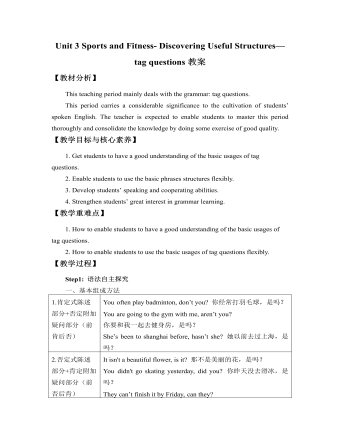
新人教版高中英语必修1Unit 3 Sports and Fitness- Discovering Useful Structures—tag questions教案
【教材分析】This teaching period mainly deals with the grammar: tag questions.This period carries a considerable significance to the cultivation of students’ spoken English. The teacher is expected to enable students to master this period thoroughly and consolidate the knowledge by doing some exercise of good quality.【教学目标与核心素养】1. Get students to have a good understanding of the basic usages of tag questions.2. Enable students to use the basic phrases structures flexibly.3. Develop students’ speaking and cooperating abilities.4. Strengthen students’ great interest in grammar learning.【教学重难点】1. How to enable students to have a good understanding of the basic usages of tag questions.2. How to enable students to use the basic usages of tag questions flexibly.【教学过程】Step1: 语法自主探究一、基本组成方法1.肯定式陈述部分+否定附加疑问部分(前肯后否) You often play badminton, don’t you? 你经常打羽毛球,是吗?You are going to the gym with me, aren’t you?你要和我一起去健身房,是吗?She’s been to shanghai before, hasn’t she? 她以前去过上海,是吗?2.否定式陈述部分+肯定附加疑问部分(前否后肯) It isn't a beautiful flower, is it? 那不是美丽的花,是吗?You didn't go skating yesterday, did you? 你昨天没去滑冰,是吗?They can’t finish it by Friday, can they?他们不能在星期五之前完成,是吗?
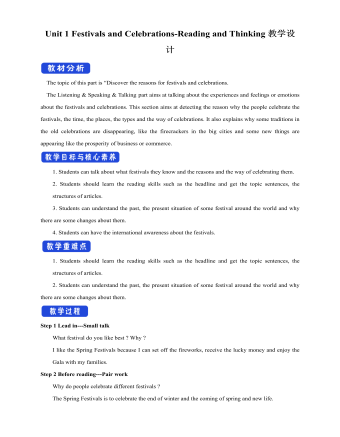
新人教版高中英语必修3Unit 1 Festivals and Celebrations-Reading and Thinking教学设计
The topic of this part is “Discover the reasons for festivals and celebrations.The Listening & Speaking & Talking part aims at talking about the experiences and feelings or emotions about the festivals and celebrations. This section aims at detecting the reason why the people celebrate the festivals, the time, the places, the types and the way of celebrations. It also explains why some traditions in the old celebrations are disappearing, like the firecrackers in the big cities and some new things are appearing like the prosperity of business or commerce. 1. Students can talk about what festivals they know and the reasons and the way of celebrating them.2. Students should learn the reading skills such as the headline and get the topic sentences, the structures of articles.3. Students can understand the past, the present situation of some festival around the world and why there are some changes about them. 4. Students can have the international awareness about the festivals.1. Students should learn the reading skills such as the headline and get the topic sentences, the structures of articles.2. Students can understand the past, the present situation of some festival around the world and why there are some changes about them.Step 1 Lead in---Small talkWhat festival do you like best ? Why ?I like the Spring Festivals because I can set off the fireworks, receive the lucky money and enjoy the Gala with my families.Step 2 Before reading---Pair workWhy do people celebrate different festivals ?The Spring Festivals is to celebrate the end of winter and the coming of spring and new life.The Mid-autumn Day is to celebrate the harvest and admire the moon.
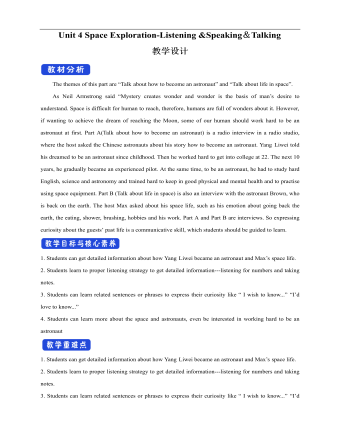
新人教版高中英语必修3Unit 4 Space Exploration-Listening&Speaking&Talking教学设计二
The themes of this part are “Talk about how to become an astronaut” and “Talk about life in space”. As Neil Armstrong said “Mystery creates wonder and wonder is the basis of man’s desire to understand. Space is difficult for human to reach, therefore, humans are full of wonders about it. However, if wanting to achieve the dream of reaching the Moon, some of our human should work hard to be an astronaut at first. Part A(Talk about how to become an astronaut) is a radio interview in a radio studio, where the host asked the Chinese astronauts about his story how to become an astronaut. Yang Liwei told his dreamed to be an astronaut since childhood. Then he worked hard to get into college at 22. The next 10 years, he gradually became an experienced pilot. At the same time, to be an astronaut, he had to study hard English, science and astronomy and trained hard to keep in good physical and mental health and to practise using space equipment. Part B (Talk about life in space) is also an interview with the astronaut Brown, who is back on the earth. The host Max asked about his space life, such as his emotion about going back the earth, the eating, shower, brushing, hobbies and his work. Part A and Part B are interviews. So expressing curiosity about the guests’ past life is a communicative skill, which students should be guided to learn.1. Students can get detailed information about how Yang Liwei became an astronaut and Max’s space life.2. Students learn to proper listening strategy to get detailed information---listening for numbers and taking notes.3. Students can learn related sentences or phrases to express their curiosity like “ I wish to know...” “I’d love to know...”4. Students can learn more about the space and astronauts, even be interested in working hard to be an astronaut
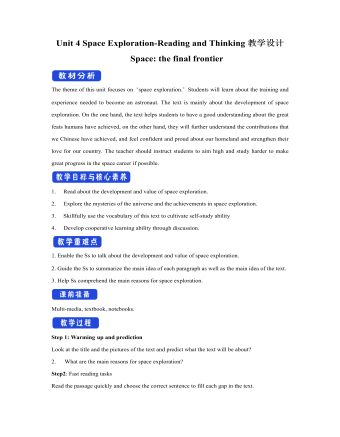
新人教版高中英语必修3Unit 4 Space Exploration-Reading and Thinking教学设计二
The theme of this unit focuses on “space exploration.” Students will learn about the training and experience needed to become an astronaut. The text is mainly about the development of space exploration. On the one hand, the text helps students to have a good understanding about the great feats humans have achieved, on the other hand, they will further understand the contributions that we Chinese have achieved, and feel confident and proud about our homeland and strengthen their love for our country. The teacher should instruct students to aim high and study harder to make great progress in the space career if possible.1. Read about the development and value of space exploration.2. Explore the mysteries of the universe and the achievements in space exploration.3. Skillfully use the vocabulary of this text to cultivate self-study ability 4. Develop cooperative learning ability through discussion.1. Enable the Ss to talk about the development and value of space exploration.2. Guide the Ss to summarize the main idea of each paragraph as well as the main idea of the text.3. Help Ss comprehend the main reasons for space exploration. Multi-media, textbook, notebooks.Step 1: Warming up and predictionLook at the title and the pictures of the text and predict what the text will be about?2. What are the main reasons for space exploration?
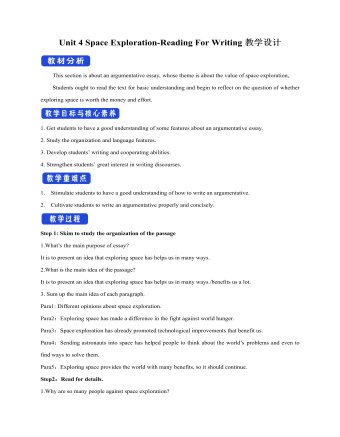
新人教版高中英语必修3Unit 4 Space Exploration-Reading For Writing教学设计一
另一方面,其余的人反对这个计划,因为它可能会导致一些不好的影响。7.I hold the belief that space exploration not only enable us to understand how the universe began but also help us survived well into the future.我坚信探索太空不仅能够使我们了解宇宙的起源而且能够帮助我们更好地走进未来。8.I think we should spend more time and money exploring space so as to provide new and better solutions to people's shortterm and longterm problems.为了给人类的短期和长期问题提供更新和更好的解决方法,我认为我们应该花更多的时间和金钱来探索太空。9.From my point of view,it is wrong of young people to depend on their telephones too much,which may do harm to both their physical and mental health.在我看来,年轻人过度依赖手机是不对的,因为它们可能会对他们的身心健康都有害。最近你班同学就“人类是否应该进行宇宙探索”这个问题进行了激烈的讨论。有人认为,探索宇宙不仅让人类更好地了解宇宙的发展,还可以用来指导农业生产,以及把一些探索太空的高新技术用于现实生活;也有一些人认为探索太空花掉了大量的人力物力;影响了人们的生活水平。请你根据以下情况写一篇报告并发表自己的观点。注意:1.写作内容应包括以上全部要点,可适当发挥,使上下文连贯;
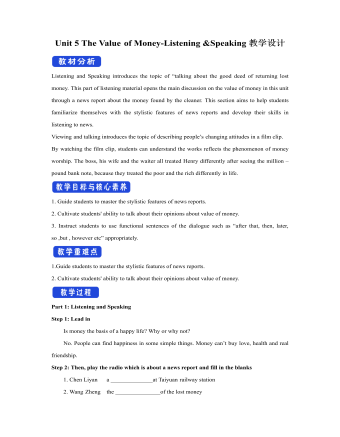
新人教版高中英语必修3Unit 5 The Value of Money-Listening &Speaking教学设计
Step 4: Listen again and decide if the following statements are true (T) or false (F).1 It was the first time Chen Liyan's story was reported. T口 F口2 Chen found 10,000 yuan in a small plastic bag in Taiyuan railway station口 F口3 Wang Zheng apologized to Chen because he couldn't offer her more money. T口 F口4 Chen took out a large loan to cure her daughter, T口 F口5 Wang set up a fundraising website for Chen's daughter after Chen told him about her situation. T口 F口Step 5:After listening, discuss the questions.1 What kind of person do you think Chen Liyan is?Chen Liyan is generous and honest because she returned a large sum of money to the owner.2 Did Chen return the money because she didn't need it?No. She returned the money because it was the right thing to do. Evidence for this is that she refused to accept the reward money because she felt that it had not been earned. 3 Is it common for people to do what Chen did?It depends on the culture. In some countries it is quite common to return money that has been found. In other countries, people believe "Finders are keepers!" 4 How did Wang Zheng feel about the return of his money?He must have been very happy and relieved to have gotten his money back. We know this because he thanked Chen repeatedly and even offered her a reward.5 Why did Ma Dongbao tell Wang about Chen's family?He must have had great sympathy for Chen and her daughter and wanted to help them.'We know this because he arranged help for them. 6 How did the news reporter feel about Chen's actions?The news reporter felt that it showed that money wasn't the most important thing in life. We know this because the reporter told us that this is what Chen believes. and then said, “that's a great attitude to take."
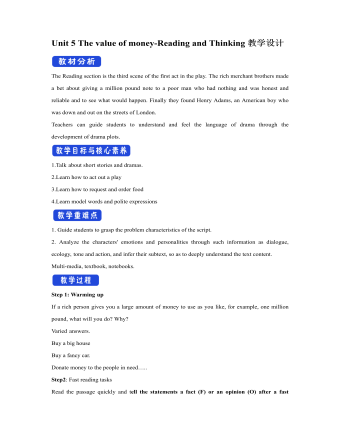
新人教版高中英语必修3Unit 5 The value of money-Reading and Thinking教学设计二
? Could you offer me some kind of work here?? I don’t want your charity, I just want an honest job.? Careless: I landed in Britain by accident.Step 7:Consolidation.? Find Henry? Roderick and Oliver were I .making a bet when they saw Henry, a poor young man. ? Know Henry? About a month ago, Henry was sailing and later he found himself carried out to sea by a strong wind. Fortunately, he 2.was spotted by a ship. And it was the ship that brought him to 3.England? Offer money to Henry ? Oliver and Roderick gave Henry a letter and told him that there was money in it. They 4.persuaded him to accept it, and made him 5.promise that it wouldn't be opened until 2 o'clock.Step 8:Language pointsa large amount of: a large quantity of; a great deal ofe.g. They bought a large amount of furniture before they moved their new house.make a bet: make an arrangement to risk money, etc. on an event of which the result is doubtful.e.g. We made a bet on the result of the match.permit sb to do something: allow somebody to do somethinge.g. My mother doesn’t permit me to ride in the street after it rained.by accident: as a result of chancee.g. I only found it by accident.stare at: look at somebody or something with the eyes wide open in a fixed gaze( in astonishment, wonder, fear, etc)to be honest: to tell you the truth; to be franke.g. To be honest, I don’t think we have a chance of winning.Step7 Homework:What do you think will happen to Henry? Will the bank-note help him or get him into trouble?
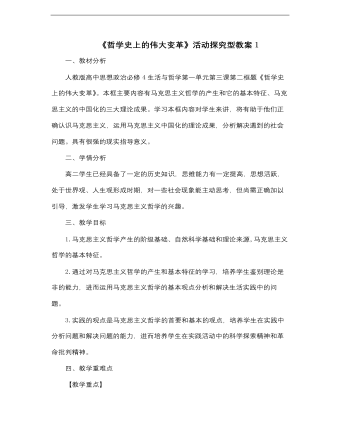
高中思想政治人教版必修四《哲学史上的伟大变革活动探究型》教案
一、教材分析人教版高中思想政治必修4生活与哲学第一单元第三课第二框题《哲学史上的伟大变革》。本框主要内容有马克思主义哲学的产生和它的基本特征、马克思主义的中国化的三大理论成果。学习本框内容对学生来讲,将有助于他们正确认识马克思主义,运用马克思主义中国化的理论成果,分析解决遇到的社会问题。具有很强的现实指导意义。二、学情分析高二学生已经具备了一定的历史知识,思维能力有一定提高,思想活跃,处于世界观、人生观形成时期,对一些社会现象能主动思考,但尚需正确加以引导,激发学生学习马克思主义哲学的兴趣。三、教学目标1.马克思主义哲学产生的阶级基础、自然科学基础和理论来源,马克思主义哲学的基本特征。2.通过对马克思主义哲学的产生和基本特征的学习,培养学生鉴别理论是非的能力,进而运用马克思主义哲学的基本观点分析和解决生活实践中的问题。3.实践的观点是马克思主义哲学的首要和基本的观点,培养学生在实践中分析问题和解决问题的能力,进而培养学生在实践活动中的科学探索精神和革命批判精神。
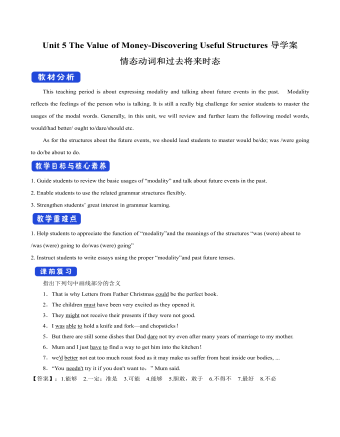
新人教版高中英语必修3Unit 5 The Value of Money-Discovering Useful Structures导学案
4.They were going to find someone to take part in their bet when they saw Henry walking on the street outside.[归纳]1.过去将来时的基本构成和用法过去将来时由“would+动词原形”构成,主要表示从过去某一时间来看将要发生的动作(尤其用于宾语从句中),还可以表示过去的动作习惯或倾向。Jeff knew he would be tired the next day.He promised that he would not open the letter until 2 o'clock.She said that she wouldn't do that again.2.表示过去将来时的其他表达法(1)was/were going to+动词原形:该结构有两个主要用法,一是表示过去的打算,二是表示在过去看来有迹象表明将要发生某事。I thought it was going to rain.(2)was/were to+动词原形:主要表示过去按计划或安排要做的事情。She said she was to get married next month.(3)was/were about to+动词原形:表示在过去看来即将要发生的动作,由于本身已含有“即将”的意味,所以不再与表示具体的将来时间状语连用。I was about to go to bed when the phone rang.(4)was/were+现在分词:表示在过去看来即将发生的动作,通常可用于该结构中的动词是come,go,leave,arrive,begin,start,stop,close,open,die,join,borrow,buy等瞬间动词。Jack said he was leaving tomorrow.
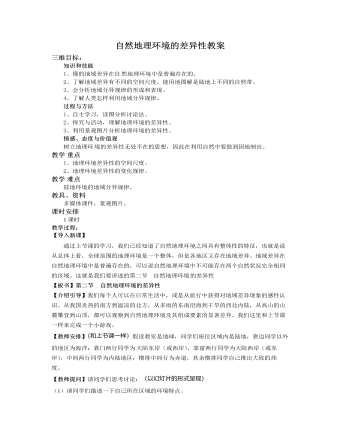
人教版高中地理必修1自然地理环境的差异性教案
注:号码代表自然带类型【讨论问题】(1)请将板图中符号与你所在的自然带“对号入座”(提问几位同学)。(2)哪些属于温带森林?哪些属于热带森林?(3)南半球缺少哪些自然带?(4)气 候类型相同而自然带不同的是哪种气候类型,哪些自然带?(5)自然带相同,气候类型不同的是哪种自然带,哪些气候类型?(6)两组同学“通道”之间所处的是什么自然带?(答:过渡带,说明自然带没有严格界线,整个自然界是非常和谐地过渡、相互联系结成的有机整体)。【放录像片】《各自然带景观》,看一段录像增加感性认识(教师可以使用自己编辑的录像资料)。【学生讨论】阅读课本P98“世界陆地自然带分布图”了解自然 带的基本分布情况:【学生回答】略。【教师总结】
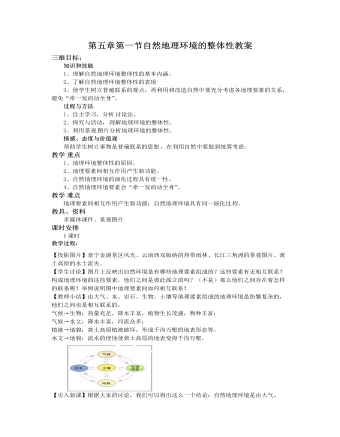
人教版高中地理必修1第五章第一节自然地理环境的整体性教案
知识和技能 1、理解自然地理环境整体性的基本内涵。2、了解自然地理环境整体性的表现3、使学生树立普遍联系的观点,再利用和改造自然中要充分考虑各地理要素的关系,避免“牵一发而动全身”。过程与方法 1、自主学习,分析 讨论法。2、探究与活动, 理解地理环境的整体性。3、利用景观 图片分析地理环境的整体性。情感、态度与价值观帮助学生树立事物是普遍联系的思想 ,在利用自然中要做到统筹考虑。教学 重点1、地理环境整体性的原因。2、地理要素间相互作用产生新功能。3、自然地理环境的演化过程具有统一性。4、自然地理环境要素会“牵一发而动全身”。教学 难点地理要素间相互作用产生新功能;自然地理环境具有同一演化过 程。教具、资料多媒体课件、景观图片课时安排
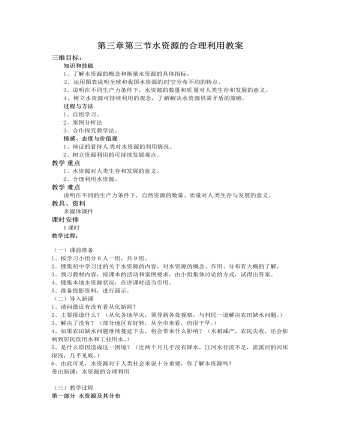
人教版高中地理必修1第三章第三节水资源的合理利用教案
5、请列举开源的措施。(包括合理开发和提取地下水;修筑水库;开渠引水实行跨流域调水;海水淡化;人工增雨等。6、开源“五水”歌:开发地下水、蓄积洪水,跨流域调水,淡水海水,人增雨水。能马上背出来吗?7、请列举节流的措施。(包括加强宣传教育,提高公民节水意识;重视改进农业灌溉技术,提高工业用水的重复利用率等。)8、水资源时刻影响着我们的生存和发展,尽管我们已经学习了关于如何合理利用水资源的知识,但关键还是要研究问题和解决问题,面对复杂的生活环境,具体问题要具体分析,看课本70页“活动”,请小组派代表回答问题。提示:(1)西北地区的水资源供给,从可持续发展的角度,解决水资源的供求矛盾应体现在:控制人口数量,减少用水规模;发展节水农业;保护生态环境,退耕还林还草。(2)我国缺水问题,谈谈看法:通过电视、报纸杂志、互联网收集有关水资源的资料;确定综合思维、立体思维的方法,全面多角度地寻找解决缺水的对策。
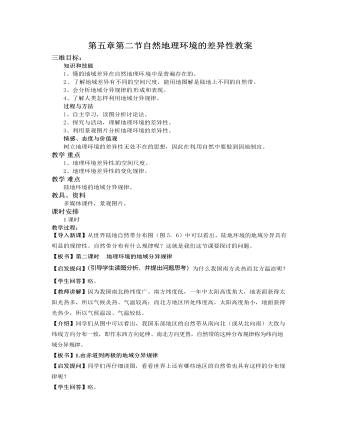
人教版高中地理必修1第五章第二节自然地理环境的差异性教案
【补充说明】我们这节课简要地分析了陆地环境的三种地域分异规律。实际上,世界上的任何事物有其一般性,也有它的特 殊性。在地带性分异规律的基础上,陆地环境因为受到海陆分布、地形 起伏等因素的影响,也会出现一些不规律的现象,这种现象称为非地带性。例如,我们在初中地理中学过绿洲。还记得什么叫绿洲吗?再比如,在南美洲的西海岸(太平洋沿岸),有一条狭长的(热带)荒漠带,而缺少热带草原带,热带雨林带主要是分布在赤道以北地区。这主要是受大的地形起伏的影响。因为南美洲西部是一列高大的安第斯山脉,受其影响,两边的气候状况不同,所以就出现了分布规律不同的自然带,这也是一种非地带性现象。【总结】有规律分布的自然带构成了全球和谐的自然环境整体。自然带之间错综复杂的、微妙的要素关系,有许多是人类还没有认识到的。因此,人类不能随意去破坏任何哪怕是极微小的环节,也许它 带来的影响会是全球性的。保护全球环境,人人有责。
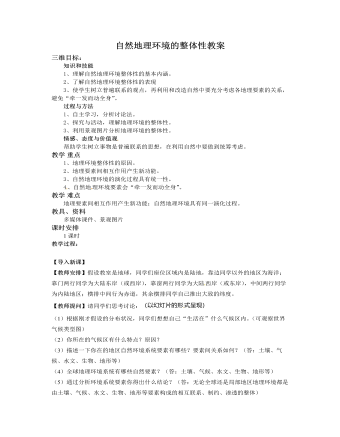
人教版高中地理必修1自然地理环境的整体性教案
1.生产功能:合成有机物的能力2.平衡功能:使自然地理要素的性质保持稳定的能力【教师讲解】生产功能主要依赖于光合作用。在光合作用过程中,植物提供叶绿素,大气提供热量和二氧化碳,土壤及水圈、岩石圈提供水分及无机盐。光合作用通过物质和能量的交换,将生物、大气、水、土壤、岩石等地理要素统一在一起,在一定的条件下,生产出有机物。由此可见,生产功能是自然环境的整体功能而非单个地理要素的功能。大气本身不具有减缓二氧化碳增加的功能,但是,在自然地理环境中,通过各地理要素的相互作用,却能消除部分新增的二氧化碳的能力,既为自然地理环境的平衡功能。请大家阅读教材P94活动,利用平衡功能的原理,解释一定范围内各物种的数量基本恒定这一现象。【学生讨论回答】略。(可参考教参)【转折】自然地理环境各要素每时每刻都在演化,如我们熟知的气候变化、地貌变化等。各个要素的发展演化是统一的,一个要素的演化伴随着其他各个要素的演化。
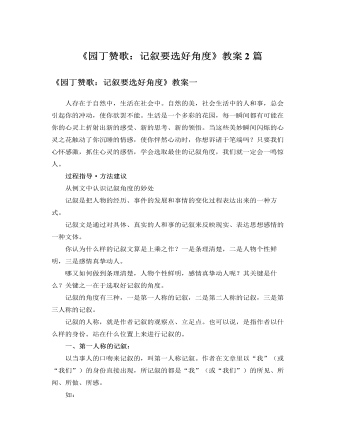
人教版高中语文必修1《园丁赞歌:记叙要选好角度》教案2篇
天上有明月,年年照相思。她夜夜沉醉在梦中。梦把空间缩短了,梦把时间凝固了,梦把世界净化了。梦中没有污秽,没有嘈杂,没有邪恶;梦中没有分离,没有创伤,没有痛苦;梦中只有柔和的月色,只有温馨的爱;梦使她永远年轻,使她不原醒来。…………啊,那个世界,是为天下最真最善最美的心灵准备的,艺术家怀着虔诚的情感,用充满魔力的琴弦,在人们的心中筑起了一座不朽的天堂,它像天地一样长久,日月一样永恒!新月微微地闭着眼睛,她清清楚楚地看到了那座天堂,真真切切地触到了那座天堂,冰凌砌成墙壁,白云铺成房顶,雾霭织成纱幔,星星串成明灯;在那里,她的头发像沐浴之后那样清爽柔软,随风飘拂,她的肌肤像披着月光那样清凉润滑,她的那颗心啊,像浸润着蒙蒙细雨的花蕾,挂着晶莹的露珠,自由地呼吸……她沉醉在那个一尘不染的美好的境界,如歌如诗,如梦如幻,如云如月,如水如烟……
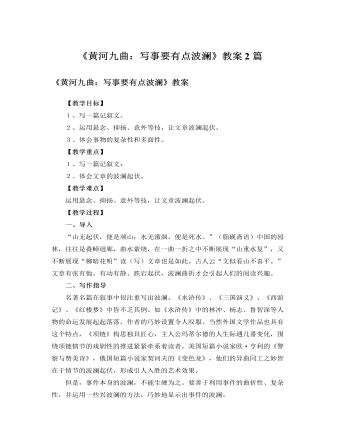
人教版高中语文必修1《黄河九曲:写事要有点波澜》教案2篇
1.悬念法悬念法又称关子。它是作者为了激发那种“紧张与期待的心理活动”,在行文中有意采取的一种积极而有效的手段。这种手段包括“设悬”和“解悬”两方面。所谓 “设悬”就是设置悬念,即在情节发生发展的关键时刻或人物命运攸关的重要关头,叙述戛然而止,转叙他事。从而引起读者强烈的寻根问底的兴趣。所谓“解悬” 也叫“释悬”,就是指在情节发展的特定阶段,通过矛盾的解决,揭示事情原委和人物命运的结局,使读者的期待心理得以满足。如《驿路梨花》,当人们正为露宿而发愁时出现了一间神秘的小屋,小屋的主人是谁呢?猜想间,有人来了,但也不是屋子主人,那小屋子的主人是谁呢?终于知道了小屋是解放军盖的,但为什么要盖这间小屋呢?这样“设悬——释悬——带出新悬念”,环环相扣、层层递进,使文章韵味无穷。
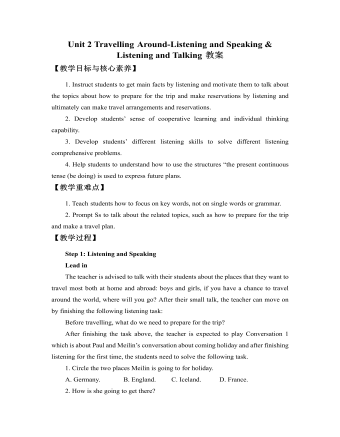
新人教版高中英语必修1Unit 2 Travelling Around-Listening and Speaking & Listening and Talking教案
【教学目标与核心素养】1. Instruct students to get main facts by listening and motivate them to talk about the topics about how to prepare for the trip and make reservations by listening and ultimately can make travel arrangements and reservations. 2. Develop students’ sense of cooperative learning and individual thinking capability. 3. Develop students’ different listening skills to solve different listening comprehensive problems.4. Help students to understand how to use the structures “the present continuous tense (be doing) is used to express future plans.【教学重难点】1. Teach students how to focus on key words, not on single words or grammar.2. Prompt Ss to talk about the related topics, such as how to prepare for the trip and make a travel plan.【教学过程】Step 1: Listening and SpeakingLead inThe teacher is advised to talk with their students about the places that they want to travel most both at home and abroad: boys and girls, if you have a chance to travel around the world, where will you go? After their small talk, the teacher can move on by finishing the following listening task:Before travelling, what do we need to prepare for the trip?
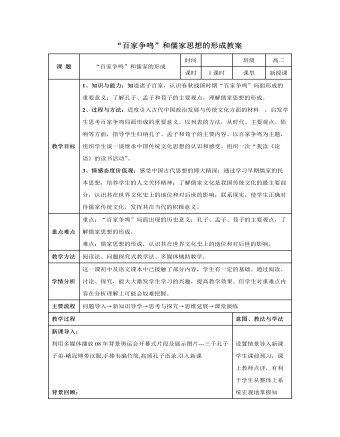
人教版高中历史必修3“百家争鸣”和儒家思想的形成教案
1、知识与能力:知道诸子百家,认识春秋战国时期“百家争鸣”局面形成的重要意义;了解孔子、孟子和荀子的主要观点,理解儒家思想的形成。2、过程与方法:适度引入古代中国政治发展与传统文化方面的材料 ,启发学生思考百家争鸣局面形成的重要意义。以列表的方法,从时代、主要观点、影响等方面,指导学生归纳孔子、孟子和荀子的主要内容。以百家争鸣为主题,组织学生谈一谈继承中国传统文化思想的认识和感受。组织一次“我读《论语》的读书活动”。3、情感态度价值观:感受中国古代思想的博大精深:通过学习早期儒家的民本思想,培养学生的人文关怀精神;了解儒家文化是我国传统文化的最主要部分,认识其在世界文化史上的地位和对后世的影响;联系现实,使学生正确对待儒家传统文化,发挥其在当代的积极意义。
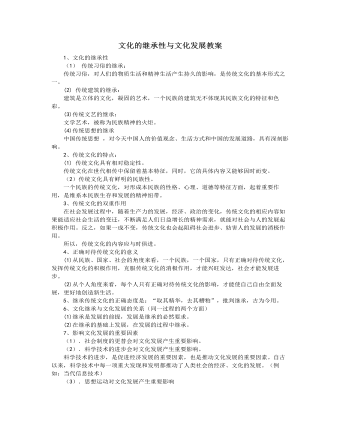
人教版高中政治必修3文化的继承性与文化发展教案
(1)继承是发展的前提,发展是继承的必然要求。 (2)在继承的基础上发展,在发展的过程中继承。 7、影响文化发展的重要因素(1).社会制度的更替会对文化发展产生重要影响。(2).科学技术的进步会对文化发展产生重要影响。科学技术的进步,是促进经济发展的重要因素,也是推动文化发展的重要因素。自古以来,科学技术中每一项重大发现和发明都推动了人类社会的经济、文化的发展。(例如:当代信息技术)(3).思想运动对文化发展产生重要影响思想运动往往成为社会变革的先导,不同思想在思想运动中相互激荡,不但催生着社会变革,也促进了文化的发展。(4)、教育在文化传承中的重要作用教育是人类特有的传承文化的能动性活动,具有选择、传递、创造文化的特定功能,在人的教化与培育上始终扮演着重要的角色。随着教育方式的不断变革,教育在人类文化的传承中将产生越来越大的影响。





















